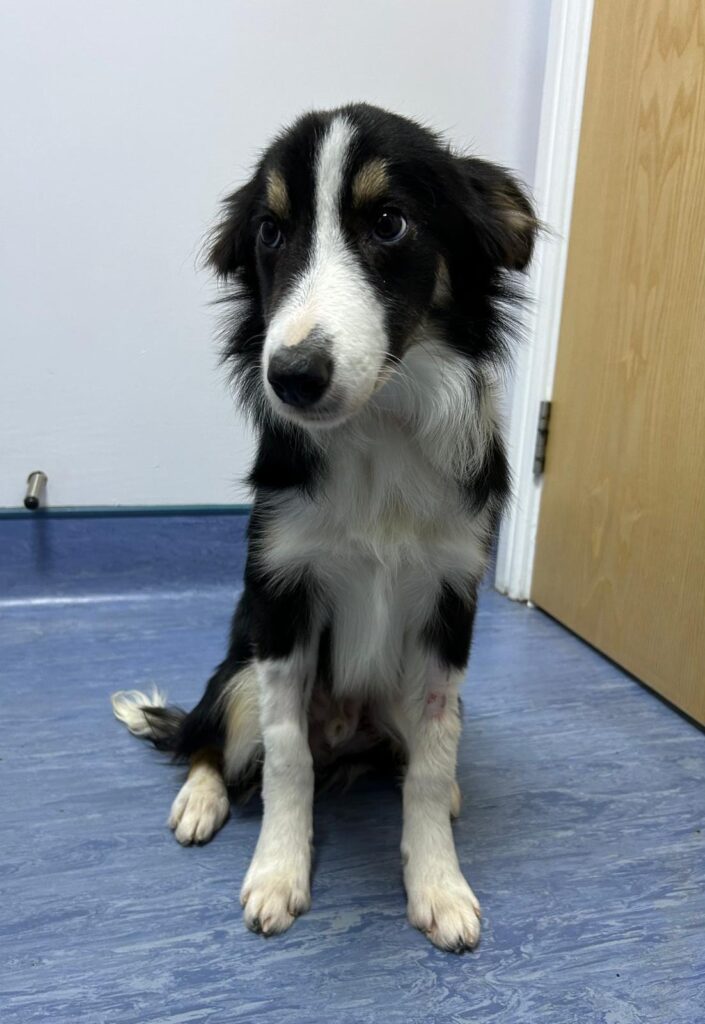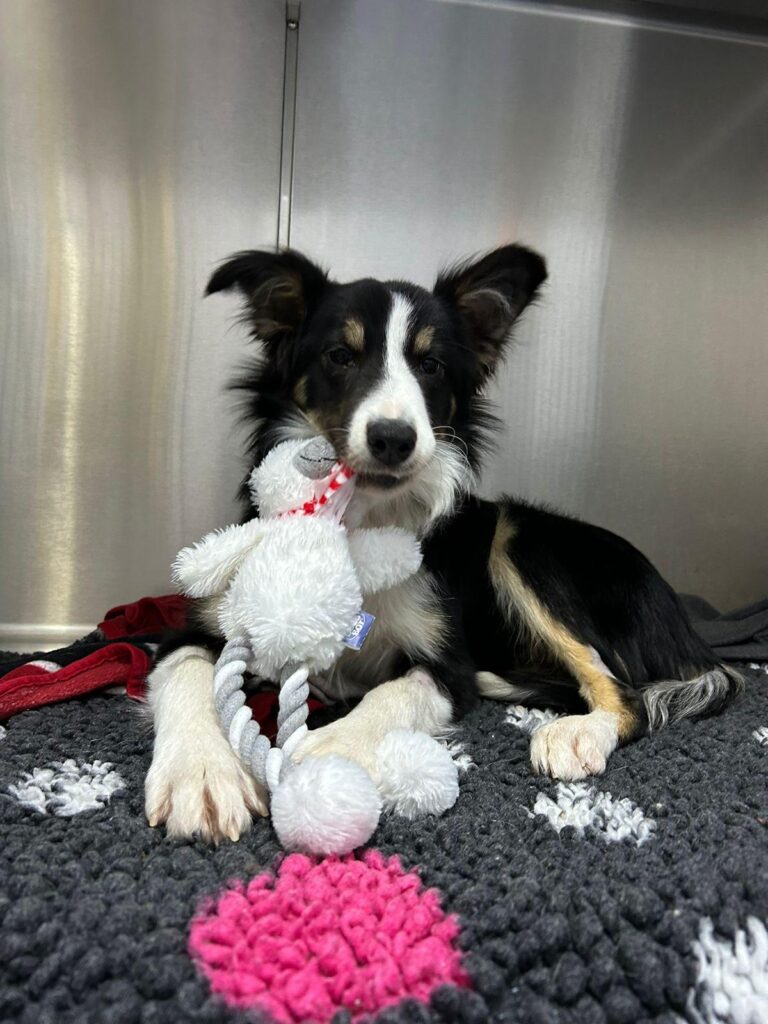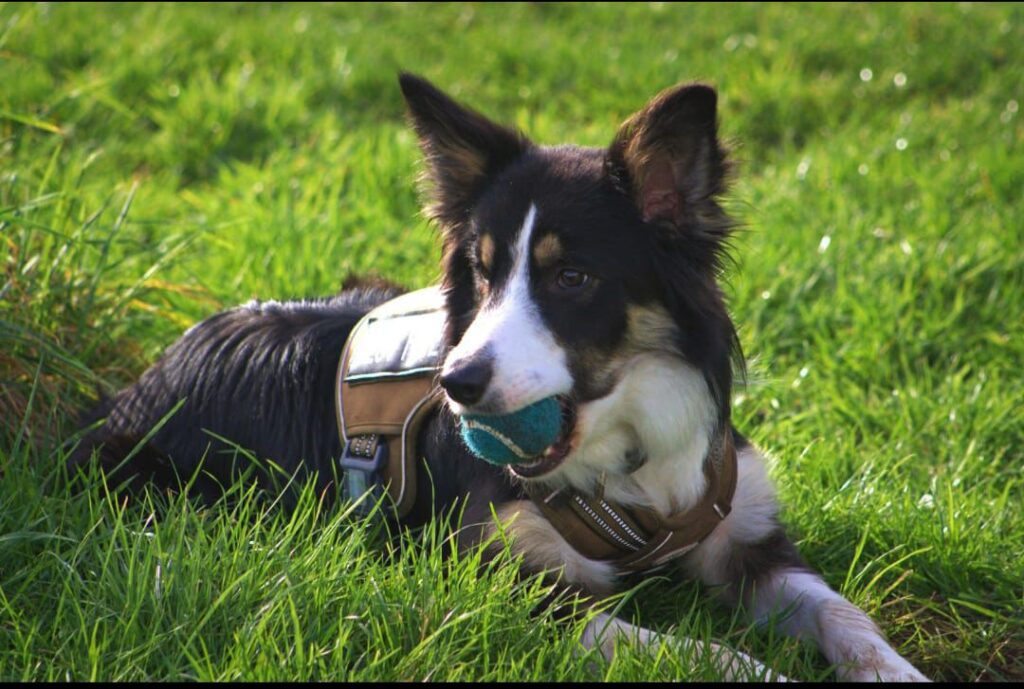Brave Pet of the Month…Hunter!
Handsome Hunter is a much-loved 11-month-old Border Collie who is a familiar face at Hollybank after his diagnosis of Imerslund-Gräsbeck syndrome (IGS), an uncommon genetic disorder of Border Collies.
Hunter initially presented to us at 8 months old with vomiting and a reduced appetite which seemed to coincide with eating some raw fish the night before. Given his age and the history of scavenging we suspected a gastrointestinal upset and started treatment with an anti-sickness medication. However, later that evening Hunter represented to us as an emergency because he had become very wobbly and collapsed.
Hunter really was a very miserable boy and with so many possible causes of collapse we decided to carry out further investigations. We found that he had low blood glucose (hypoglycaemia) which would be a plausible cause of his weakness. Intravenous supplementation of glucose was administered which seemed to improve Hunter’s demeanour and he was soon able to stand and walk again.
However, the important question was why had his blood glucose dropped this low in the first place? In conjunction with his other symptoms – vomiting, poor appetite and being quite small for his age we had a few conditions as possible diagnoses.
In young patients we can be concerned about developmental conditions in the liver (portosystemic shunt) or a gastrointestinal obstruction (usually a foreign object). Full blood tests including bile acids for evidence of the shunt and an abdominal ultrasound for evidence of an obstruction were performed and were all found to be normal.
It was considered that Hunter’s hypoglycaemia may have been secondary to his poor appetite, so we continued supportive care with fluid therapy and sensitive food alongside 24-hour blood glucose monitoring. Hunter recovered well over the next few days and was discharged back home.
Two weeks later however similar signs recurred; vomiting, inappetence, wobbliness and collapse. This time Hunter had also developed diarrhoea and he was documented to be losing weight. Blood glucose testing was normal on this occasion and so further conditions were considered. These included some endocrine disorders such as an underactive thyroid, low cortisol and some digestive disorders including lack of pancreatic enzymes and/or cobalamin (Vitamin B12).
Collie’s can have a rare hereditary condition called Imerslund-Gräsbeck syndrome where they are unable to absorb vitamin B12 from their intestinal tract. Since vitamin B12 is solely sourced from diet and cannot be made in the body, this leads to a deficiency and problems associated with this including poor immune function, anaemia, weight loss and lethargy.
Due to this, we first tested Hunter’s vitamin B12 levels, which were in fact low. We started supplementing the B12 via a subcutaneous injection whilst trying to confirm if this was a hereditary cause or secondary to a pancreatic insufficiency.
To diagnose a hereditary cause for Hunter’s low B12, we sent off a blood sample to check Hunter’s DNA for the mutation which would cause the syndrome. In the meantime, Hunter also received IV fluids, anti-sickness medication, antibiotics for an abscess he developed (likely due to his poor immune system) and paracetamol.
Hunter showed a positive response to the B12 injection and became brighter, started eating better and playing. He was eventually discharged home after 6 days in hospital with us whilst we awaited his genetic test result.
Hunter tested positive for the gene mutation responsible for Imerslund-Gräsbeck syndrome. He visited us again for a recheck and to continue the vitamin B12 supplementation as we now knew he would need lifelong supplementation. Hunter was doing amazingly well at home, eating, playing and doing all the things a puppy should do! He gained 2.7kg in the first 2 weeks after leaving the hospital!
Hunter will need to have B12 supplementation for the rest of his life otherwise he would become poorly again but Hunter is always a brave, happy boy and it’s always a pleasure to see him. He will soon be celebrating his 1st birthday and last time we saw him he was nearly 10kg heavier than when he left the hospital!




